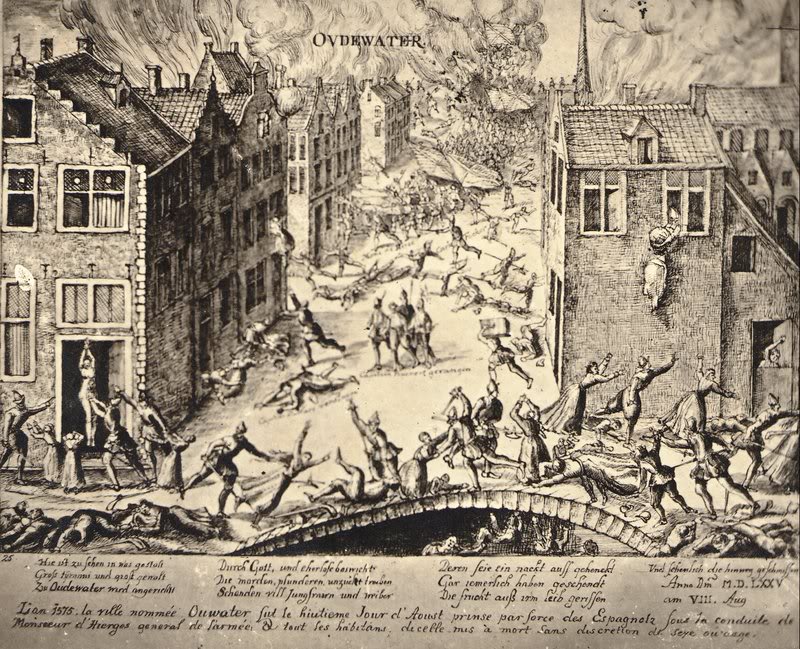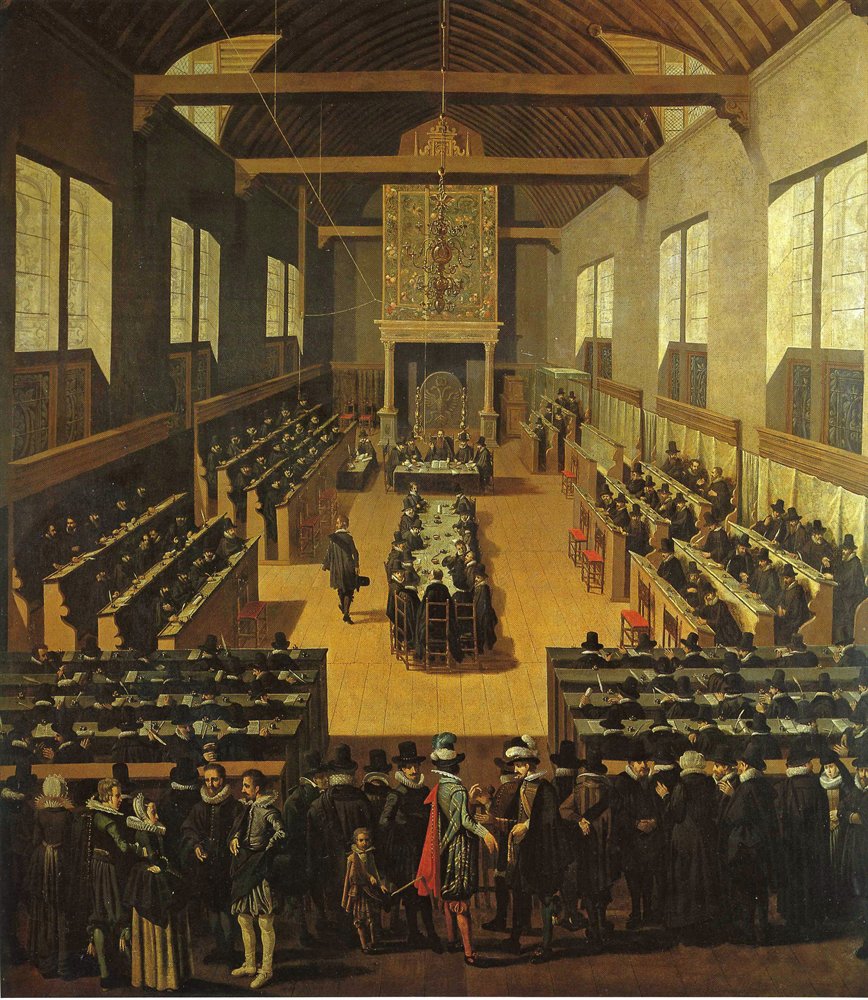|
Jacobus Arminius
Jacobus Arminius (; Dutch language, Dutch: ''Jakob Hermanszoon'' ; 10 October 1560 – 19 October 1609) was a Dutch Reformed Christianity, Reformed minister and Christian theology, theologian during the Protestant Reformation period whose views became the basis of Arminianism and the Dutch Remonstrants, Remonstrant movement. He served from 1603 as professor in theology at the University of Leiden and wrote many books and treatises on theology. Following his death, his challenge to the Reformed standard, the ''Belgic Confession'', provoked ample discussion at the Synod of Dort, which crafted the five points of Calvinism in response to Arminius's teaching. Early life Jakob Hermanszoon was born in 1559 or 1560 in Oudewater, Utrecht (province), Utrecht, Netherlands. He became an orphan while still young. His father Herman, a manufacturer of weapons, died, leaving his wife a widow with small children. He never knew his father, and his mother was killed during the Siege of Oudewat ... [...More Info...] [...Related Items...] OR: [Wikipedia] [Google] [Baidu] |
The Reverend
The Reverend (abbreviated as The Revd, The Rev'd or The Rev) is an honorific style (form of address), style given to certain (primarily Western Christian, Western) Christian clergy and Christian minister, ministers. There are sometimes differences in the way the style is used in different countries and church traditions. ''The Reverend'' is correctly called a ''style'', but is sometimes referred to as a title, form of address, or title of respect. Etymology The term is an anglicisation of the Latin , the style originally used in Latin documents in medieval Europe. It is the gerundive or future passive participle of the verb ("to respect; to revere"), meaning "[one who is] to be revered/must be respected". ''The Reverend'' is therefore equivalent to ''the Honourable'' or ''the Venerable''. Originating as a general term of respectful address in the 15th century, it became particularly associated with clergy by the 17th century, with variations associated with certain ranks in th ... [...More Info...] [...Related Items...] OR: [Wikipedia] [Google] [Baidu] |
Reformed Christianity
Reformed Christianity, also called Calvinism, is a major branch of Protestantism that began during the 16th-century Protestant Reformation. In the modern day, it is largely represented by the Continental Reformed Christian, Presbyterian, Congregational, and Waldensians traditions, as well as parts of the Methodist, Anglican (known as "Episcopal" in some regions) and Baptist traditions. Reformed theology emphasizes the authority of the Bible and the sovereignty of God, as well as covenant theology, a framework for understanding the Bible based on God's covenants with people. Reformed churches emphasize simplicity in worship. Several forms of ecclesiastical polity are exercised by Reformed churches, including presbyterian, congregational, and some episcopal. Articulated by John Calvin, the Reformed faith holds to a spiritual (pneumatic) presence of Christ in the Lord's Supper. Emerging in the 16th century, the Reformed tradition developed over several generation ... [...More Info...] [...Related Items...] OR: [Wikipedia] [Google] [Baidu] |
Marburg
Marburg (; ) is a college town, university town in the States of Germany, German federal state () of Hesse, capital of the Marburg-Biedenkopf Districts of Germany, district (). The town area spreads along the valley of the river Lahn and has a population of approximately 76,000. Having been awarded town privileges in 1222, Marburg served as capital of the Landgrave, landgraviate of Hessen-Marburg during periods of the 15th to 17th centuries. The University of Marburg was founded in 1527 and dominates the public life in the town to this day. Marburg is a historic centre of the pharmaceutical industry in Germany, and there is a plant in the town (by BioNTech) to produce vaccines to tackle Covid-19. History Founding and early history Like many settlements, Marburg developed at the crossroads of two important early medieval highways: the trade route linking Cologne and Prague and the trade route from the North Sea to the Alps and on to Italy, the former crossing the river La ... [...More Info...] [...Related Items...] OR: [Wikipedia] [Google] [Baidu] |
Rudolph Snellius
Rudolph Snel van Royen (5 October 1546 – 2 March 1613), Latinized as Rudolphus Snellius, was a Dutch linguist and mathematician who held appointments at the University of Marburg and the University of Leiden. Snellius was an influence on some of the leading political and intellectual forces of the Dutch Golden Age. Life Rudolph Snel van Royen was born on 5 October 1546 in Oudewater. Born to a wealthy family in Episcopal principality of Utrecht while this province was under the dominion of the emperor Charles V, Rudolf Snel grew up in the city of Oudewater. At maturity he left to study at the University of Cologne under Valentin Naboth and at the University of Heidelberg under Immanuel Tremellius and soon received a teaching position at the University of Marburg. Though trained in Aristotelian logic, he had become impressed with the new logic of Petrus Ramus, which he taught along with mathematics and languages at his university posts. In 1578, he returned to Oudewater ... [...More Info...] [...Related Items...] OR: [Wikipedia] [Google] [Baidu] |
Protestantism
Protestantism is a branch of Christianity that emphasizes Justification (theology), justification of sinners Sola fide, through faith alone, the teaching that Salvation in Christianity, salvation comes by unmerited Grace in Christianity, divine grace, the priesthood of all believers, and the Bible as the sole infallible source of authority for Christian faith and practice. The five solae, five ''solae'' summarize the basic theological beliefs of mainstream Protestantism. Protestants follow the theological tenets of the Reformation, Protestant Reformation, a movement that began in the 16th century with the goal of reforming the Catholic Church from perceived Criticism of the Catholic Church, errors, abuses, and discrepancies. The Reformation began in the Holy Roman Empire in 1517, when Martin Luther published his ''Ninety-five Theses'' as a reaction against abuses in the sale of indulgences by the Catholic Church, which purported to offer the remission of the Purgatory, temporal ... [...More Info...] [...Related Items...] OR: [Wikipedia] [Google] [Baidu] |
Theodorus Aemilius
Theodoros or Theodorus () is a masculine given name, from which Theodore is derived. The feminine version is Theodora. It may refer to: Ancient world :''Ordered chronologically'' * Theodorus of Samos, 6th-century BC Greek sculptor, architect and inventor * Theodorus of Cyrene, 5th-century BC Libyan Greek mathematician * Theodorus of Byzantium, late 5th-century BC Greek sophist and orator * Theodorus the Atheist (c. 340–c. 250 BC), Libyan Greek philosopher * Theodorus of Athamania (), King of a tribe in Epirus * Theodorus (meridarch) (), civil governor of the Swat province of the Indo-Greek kingdom * Theodorus of Gadara, 1st-century BC Greek rhetorician * Theodorus of Asine (), Greek Neoplatonist philosopher * Theodorus of Tabennese (c. 314–368), Egyptian Christian monk * Theodorus (usurper) (), Roman usurper against Emperor Valens * Theodorus Priscianus, 4th-century physician at Constantinople * Theodorus I (bishop of Milan) (died 490) * Theodorus (consul 505) (), Ro ... [...More Info...] [...Related Items...] OR: [Wikipedia] [Google] [Baidu] |
Siege Of Oudewater (1575)
The siege of Oudewater was an event during the Eighty Years' War that took place in the Dutch town of Oudewater, culminating in the Oudewater Massacre ( ''Oudewaterse moord''). The siege by Spanish troops started on 19 July 1575 and ended on 7 August 1575, when the town was taken by storm and plundered. Background In 1568 a garrison of the Spanish Army was stationed in Oudewater. On 19 June 1572 Adriaen van Swieten, a nobleman and deputy of William of Orange, entered the town with a small number of troops and convinced it to join the Dutch Revolt against Philip II of Spain. Siege and massacre The siege by Spanish troops under command of stadtholder Gillis van Berlaymont started on 19 July 1575 and ended in a bloodbath on 7 August 1575. Many of the inhabitants were put to the sword, and some citizens set their own houses on fire to spite looters, leading to a major conflagration. In total, as many as half the inhabitants of the town may have died. Commemoration In 1615 the ... [...More Info...] [...Related Items...] OR: [Wikipedia] [Google] [Baidu] |
Utrecht (province)
Utrecht (), officially the Province of Utrecht (), is a Provinces of the Netherlands, province of the Netherlands. It is located in the centre of the country, bordering the Eemmeer in the north-east, the province of Gelderland in the east and south-east, the province of South Holland in the west and south-west and the province of North Holland in the north-west and north. The province of Utrecht has a population of about 1,388,000 as of January 2023. With a land area of approximately , it is the second smallest province in the country. Apart from its Utrecht, eponymous capital, major cities and towns in the province are Amersfoort, Houten, IJsselstein, Nieuwegein, Veenendaal and Zeist. The busiest railway station in the Netherlands, Utrecht Centraal railway station, Utrecht Centraal, is located in the province of Utrecht. History The Archdiocese of Utrecht (695–1580), Bishopric of Utrecht was established in 695 when Saint Willibrord was consecrated bishop of the Frisians a ... [...More Info...] [...Related Items...] OR: [Wikipedia] [Google] [Baidu] |
Synod Of Dort
The Synod of Dort (also known as the Synod of Dordt or the Synod of Dordrecht) was a European transnational Synod held in Dordrecht in 1618–1619, by the Dutch Reformed Church, to settle a divisive controversy caused by the rise of Arminianism. The first meeting was on 13 November 1618 and the final meeting, the 154th, was on 9 May 1619. Voting representatives from eight foreign Reformed churches were also invited. ''Dort'' was a contemporary Dutch term for the town of ''Dordrecht'' (and it remains the local colloquial pronunciation). In 2014, the first entire critical edition of the Acts and Documents of the Synod was published. Background There had been previous provincial synods of Dort, and a National Synod in 1578. For that reason the 1618 meeting is sometimes called the ''Second Synod of Dort''. The acts of the Synod were tied to political intrigues that arose during the Twelve Years' Truce, a pause in the Eighty Years' War, Dutch war with Spain. After the death of Jacob ... [...More Info...] [...Related Items...] OR: [Wikipedia] [Google] [Baidu] |
Belgic Confession
The ''Confession of Faith'', popularly known as the Belgic Confession, is a confession to which many Reformed churches subscribe as a doctrinal standard. The Confession forms part of the Three Forms of Unity, which are the official subordinate standards of the Dutch Reformed Church. The confession's chief author was Guido de Brès, a Walloon Reformed pastor, active in the Low Countries, who died a martyr to the faith in 1567, during the Dutch Reformation. The name ''Belgic Confession'' follows the 17th-century Latin ''Confessio Belgica''. ''Belgica'' referred to the whole of the Low Countries, both north and south, which today is divided into the Netherlands and Belgium. Authorship and revisions The initial text was prepared by de Brès in 1559, and was influenced by the Gallic Confession. De Brès showed it in draft to others, including Hadrian à Saravia, Herman Moded and Godfried van Wingen (Wingius). It was revised by Franciscus Junius, who abridged the sixteenth artic ... [...More Info...] [...Related Items...] OR: [Wikipedia] [Google] [Baidu] |






